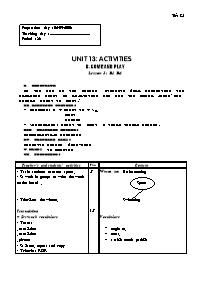Giáo án môn Tiếng Anh Lớp 7 - Unit 13: Activities - B. Come and play - Lesson 3: B1 B4

I. Objective:
By the end of the lesson, students will understand the dialogue about an invitation and use the model verbs”can, should, ought to, must.”
II.Language content:
- Grammar: S + ought to + V1
must
should
- Vocabulary: ought to, must, a table tennis paddle.
III. Teaching method:
Communicative approach
IV. Teaching aids:
Cassette player, word-cues
V.Time: 45 minutes
VI. Procedure:
Bạn đang xem tài liệu "Giáo án môn Tiếng Anh Lớp 7 - Unit 13: Activities - B. Come and play - Lesson 3: B1 B4", để tải tài liệu gốc về máy bạn click vào nút DOWNLOAD ở trên
- Preparation day : 02-09-2006 - Teaching day : - Period : 83 UNIT 13: ACTIVITIES B. COME AND PLAY Lesson 3: B1 B4 I. Objective: By the end of the lesson, students will understand the dialogue about an invitation and use the model verbs”can, should, ought to, must.” II.Language content: Grammar: S + ought to + V1 must should Vocabulary: ought to, must, a table tennis paddle. III. Teaching method: Communicative approach IV. Teaching aids: Cassette player, word-cues V.Time: 45 minutes VI. Procedure: Teacher’s and students’ activities Time Content - T asks students to name sports. - Ss work in groups to write the words on the board . - T declares the winner. Presentation + Pre-teach vocabulary - T uses: . translation . translation . picture - Ss listen, repeat and copy - T checks: ROR + Presentation dialogue - T sets the scene: “Ba invites Nam to play table tennis.” -Ss listen to the situation. - T gives the students questions and turns on the cassette twice. - Ss listen, read and answer the questions. - T gives feedback. + Presentation the target language - T elicits the model sentences from the pre-question. - Ss listen and repeat the model sentences. - T writes the sentences on the board and checks: the form, the use, the meaning and the pronunciation. - Ss listen and copy. Practice - T asks students to practice the dialogue. - Ss work in pairs to practice the dialogue. - T checks their pronunciation - T asks students to read the dialogue again and answer the questions. - Ss work in pairs to read the dialogue and answer the questions, and then write the answers on the board. - T gives feedback - T runs through the cues. - Ss repeat in chorus. - T models and guides students to practice the structure from the cues. - Ss work in pairs to practice the structure. - T controls the activity. Further practice - T asks students to do the exercise to review model verbs. - Ss work in pairs to complete the passage, and then give the answers. - T gives feedback 5’ 15’ 15’ 10’ Warm up: Brainstorming Sports Swimming Vocabulary ought to, must, a table tennis paddle What should Nam do before he plays table tennis? ( dialogue, page 134) He should do his homework. Model sentences: S1: What should Nam do before he plays table tennis? S2: He ought to do his homework. He must do his homework. Notes: Modal verbs: Ñoäng töø tình thaùi S + ought to + V1 should must Dialogue , page 134 Questions: a) What should Nam do before he plays table tennis? b) When will Nam be ready ? c) What will Ba do ? d) How many paddles does Ba have ? Answer key a. He ought to do his homework. b. Nam will be ready in a few minutes. c. Ba will finish a question for Math. d. Ba has two paddles. Word-cues drill Nam / before/ table tennis Do homework Children/ when/ swimming. Swim with an adult . We/ after meals. Brush teeth Lan/ when/ very thin. eat more. Complete the passage with the modal verbs in the box. can can’t must must not should should not ought to ought not to Scientists say life started in the ocean. However, humans aren’t natural swimmers. We (1) ___ swim as babies, but we forget and then we (2) ___ learn to swim again. We (3) ___ forget that our world is mainly water. So we (4) ____ all learn to swim. We (5)____ try to stay away from water, but it is very difficult. The time always comes when we need to cross water. We (6) ___ learn to swim when we are young. It is easier to learn then. Our parents (7) ___ help. They (8) ___ give us the opportunity to learn to swim. Answer key Scientists say life started in the ocean. However, humans aren’t natural swimmers. We can swim as babies, but we forget and then we must learn to swim again. We musn’t forget that our world is mainly water. So we should all learn to swim. We can try to stay away from water, but it is very difficult. The time always comes when we need to cross water. We ought to learn to swim when we are young. It is easier to learn then. Our parents can/should help. They should/ must give us the opportunity to learn to swim. Homework - Learn new words and structure. - Prepare Unit 13: B2 Ruùt kinh nghieäm tieát daïy:
Tài liệu đính kèm:
 giao_an_mon_tieng_anh_lop_7_unit_13_activities_b_come_and_pl.doc
giao_an_mon_tieng_anh_lop_7_unit_13_activities_b_come_and_pl.doc





